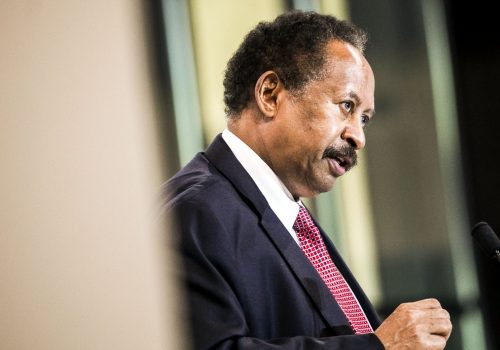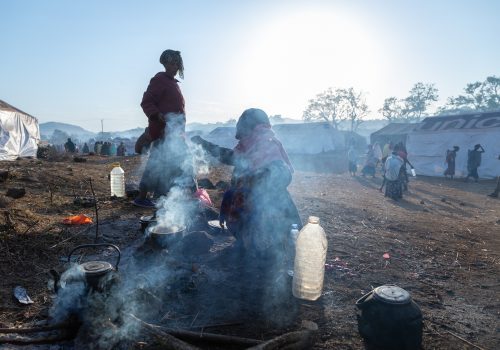FAST THINKING: What’s behind the coup in Sudan?
JUST IN
On Monday, Sudan’s military arrested the country’s civilian leaders—including Prime Minister Abdalla Hamdok—in an apparent coup that’s likely to stymie the country’s already-slow progress toward political reform. The move comes just weeks after a failed takeover attempt by loyalists to ex-dictator Omar al-Bashir and amid repeated warnings that tensions between Sudan’s civilian and military leaders were reaching their breaking point. What’s next for Sudan and the global partners in its state-building project? Our experts weigh in.
TODAY’S EXPERT REACTION COURTESY OF
- Cameron Hudson (@_hudsonc): Nonresident senior fellow at the Africa Center and former chief of staff to the US special envoy to Sudan
- Will Wechsler (@WillWechsler): Director of the Rafik Hariri Center and Middle East Programs
Out of balance
- The delicate balancing act of Sudan’s political transition had “hit a wall” lately, Cameron tells us. And the writing for the coup was on that wall. For months, the transitional governing structure—split between the civilian leaders who helped topple Bashir in 2019 and Sudan’s powerful security services—had been unraveling, with the military particularly fearful of losing its grip on power.
- “Civilian leaders had essentially reached the limits of their ability to reform the political and economic space without the military giving an inch,” Cameron adds.
- Now, General Abdel Fattah al-Burhan has taken charge, dissolving that structure and declaring a state of emergency. The military says it will install a new technocratic government until the country holds elections in July 2023. Which makes Rama wonder: “Who will run? A soldier? A Sudanese Sisi?” referring to the Egyptian strongman Abdel Fattah al-Sisi.
Money matters
- As Sudan’s economy spiraled in recent weeks—inflation, for instance, has topped 400 percent—the military seized the moment to “accuse the government of ignoring the people’s needs,” Rama notes.
- While foreign aid has helped Sudan muddle along, Cameron adds, “a full-fledged recovery… was never going to be achieved without the military relinquishing its control over the major revenue-generating parts of the economy,” from port operations to gold mining to livestock exports.
- As for the Western countries expressing shock and dismay at the upheaval in Sudan, Rama recommends they look in the mirror, considering the strictures that came with Sudan’s International Monetary Fund loans in recent years. “On the economic front, they should perhaps have supported this government rather than suffocating it with tough austerity measures that ended up plunging the population into despair and offering the military the ideal pretext they wanted to pull off this coup,” she tells us.
- And even tougher economic times are likely ahead as a result of the coup, Cameron predicts, since “international assistance will be quickly suspended, including Sudan’s debt-relief process” with the IMF.
Regional rumblings
- The military’s power grab will reverberate far beyond Sudan, Will says. Most regional powers “with interests in Sudan have never fully shared Washington’s commitment to a democratic transition,” he notes, and “some neighbors will undoubtedly quietly welcome the coup and its supposed promise of greater stability” in a country that has now suffered some sixteen coup attempts since 1956.
- It also throws into question the country’s much-vaunted normalization with Israel, Will adds. Sudanese Justice Minister Nasredeen Abdulbari met with Israeli officials on the margins of our N7 Conference earlier this month, “the first multilateral gathering between Israel and the six Arab states that have announced normalizations,” Will points out.
- But a formal normalization ceremony, for which the Biden administration had negotiated a substantial US aid package for Sudan, had been waylaid by scheduling problems, Will says. And now he thinks it won’t happen “anytime soon,” particularly since US law prevents most kinds of foreign assistance following a coup. The State Department announced Monday that it was halting $750 million in aid.
- Meanwhile, Cameron advises against any expectations that the West can push back against the coup. In fact, he says, just hours before the coup Burhan told Jeffrey Feltman, the US special envoy to the Horn of Africa, that he’d stay committed to civilian rule. “The military took this decision knowing full well the likely consequences of their actions,” Cameron explains. “So while the [international] condemnation will be quick and unanimous, it is unlikely to be sufficient to reverse this setback.”
Further reading
Mon, Oct 25, 2021
Sudan’s prime minister warned of a ‘failed state’ in 2019. Now he’s under arrest.
New Atlanticist By
Here's what Abdalla Hamdok told the Atlantic Council during a 2019 visit to Washington.
Thu, Oct 7, 2021
Time is running out for Abiy’s ‘new beginning’ in Ethiopia
New Atlanticist By
Cheering crowds and soaring rhetoric cannot hide the fact that Prime Minister Abiy Ahmed’s troubles run deeper than just one restive region.
Wed, Mar 3, 2021
The unintended consequence of Ethiopia’s civil war might be a border war with Sudan
AfricaSource By
Ethiopia is at war with itself—and the international community is struggling to respond. The stakes in Tigray are high and the civilian toll could be considerable. But there’s another scenario, with the potential to exact an even higher toll, that many observers are overlooking: conventional war that could break out at any moment between Sudan and Ethiopia and their many allied proxies.
Image: A person wearing a Sudanese flag stands in front of a burning pile of tires during a protest against the prospect of military rule in Khartoum, Sudan on October 21, 2021. Photo via REUTERS/Mohamed Nureldin Abdallah.


